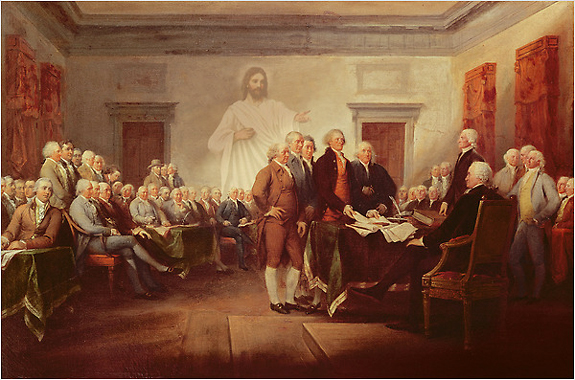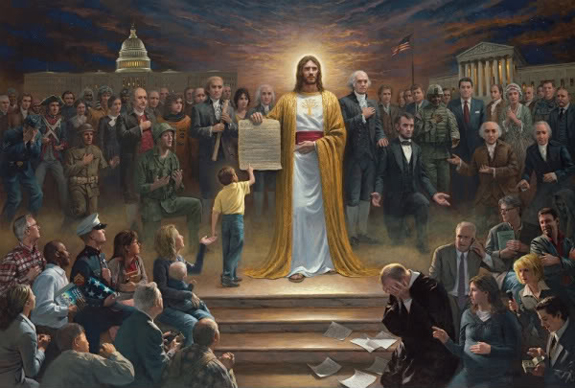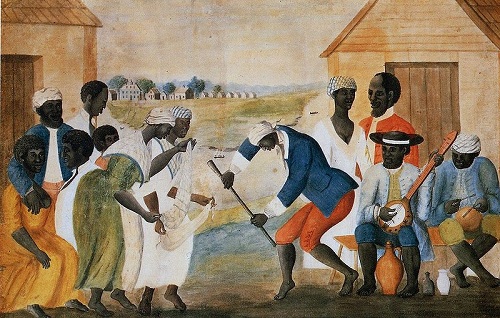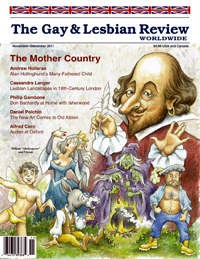BLOG, or DIE. Author Bio
Thursday, 1 December 2011
Op-Ed: The Sin of American Exceptionalism

I’ve posted my rejection of American Exceptionalism here before. According to one definition, “American Exceptionalism refers to the theory that the United States was born under the influence of a higher-power and is qualitatively more worthy than other countries.” Although it does not necessarily imply global-superiority, many conservative writers and bloggers have promoted its use in that sense. To them, the United States is like the biblical ‘shining city on a hill,’ favored by God, and exempt from the historical forces that have affected other countries. In other words, it is the belief that the U.S. is inherently better than the rest of the world. I do not accept this premise. This is not to say that I do not appreciate the freedoms and liberties that the United States has to offer, nor do I deny the blessings that we have. It simply means that I do not subscribe to what I consider to be a dangerously conceited form of political propaganda.
First let me state that I have no problem with my fellow citizens expressing their national pride or patriotism. Everyone roots for the home team. This is a perfectly natural behavior in most countries. What I do take issue with is those who consider themselves to be good Christians and students of history continuing to propagate the idea that our country is naturally superior when compared to the rest of the world. Not only is this incredibly ignorant from an intellectual standpoint, it is also contrary to biblical teachings. As both a progressive historian and active Presbyterian, I find the whole concept quite offensive.
According to Stephen M. Walt, Robert and Renée Belfer, professor of international affairs at Harvard University’s Kennedy School of Government, “The United States has enjoyed remarkable success, and Americans tend to portray their rise to world power as a direct result of the political foresight of the Founding Fathers, the virtues of the U.S. Constitution, the priority placed on individual liberty, and the creativity and hard work of the American people. In this narrative, the United States enjoys an exceptional global position today because it is, well, exceptional. But America’s past success is historically due as much to good luck as to any uniquely American virtues. This account of America’s rise does not deny that the United States did many things right, but it also acknowledges that America’s present position owes as much to good fortune as to any special genius or manifest destiny.”
He adds, “Another problem with American Exceptionalism is the belief that God is uniquely on our side. Confidence is a valuable commodity for any country. But when a nation starts to think it enjoys the mandate of heaven and becomes convinced that it cannot fail or be led astray by scoundrels or incompetents, then reality is likely to deliver a swift rebuke.”
In order to present my own case as to the historically inaccurate and blasphemous practice of preaching American Exceptionalism, I offer the following counter arguments:
Perhaps the biggest keystone in the foundation of American Exceptionalism is the belief that we always are, and have always been, the good guys…spreading prosperity everywhere we go. Other countries only worry about themselves, while we Americans remain busy keeping the rest of the world from destroying itself. It is the blind-faith that the United States is a uniquely virtuous nation, one that loves peace, nurtures liberty, respects human rights, and embraces the rule of law that is so dangerous. We all like to think that our nation behaves much better than others do, and that we are certainly morally-superior to the other super-powers. The idea that the United States is uniquely honorable may be comforting to some Americans; but it is simply not true. Here are some sobering statistics quoted from Walt’s The Myth of American Exceptionalism:
“The United States has been one of the most expansionist powers in modern history. It began as 13 small colonies clinging to the Eastern Seaboard, but eventually expanded across North America. Along the way, it eliminated most of the native population and confined the survivors to impoverished reservations. By the mid-19th century, it had pushed Britain out of the Pacific Northwest and consolidated its hegemony over the Western Hemisphere. The United States has fought numerous wars since then -- starting several of them -- and its wartime conduct has hardly been a model of restraint.”
- The 1899-1902 conquest of the Philippines killed some 200,000 to 400,000 Filipinos.
- The U.S. and its allies did not hesitate to dispatch some 305,000 German and 330,000 Japanese civilians through aerial bombing during World War II.
- The U.S. dropped more than 6 million tons of bombs during the Indochina war and is directly responsible for the deaths of many of the roughly 1 million civilians.
- The U.S.-backed Contra war in Nicaragua killed some 30,000 Nicaraguans.
- U.S. military action has led directly or indirectly to the deaths of 250,000 Muslims over the past three decades including the more than 100,000 people who died following the invasion and occupation of Iraq.
- Politically the United States routinely uses the defense of human rights and international law to justify war, but it has refused to sign most human rights treaties and is not a party to the International Criminal Court.
These numbers represent non-combatant casualties. Our military has done an exceptional job of protecting our shores and defending our freedom, but the civilian attritions committed during America’s quest for diplomacy clearly explain why the rest of the world has thought of us as being anything but exceptional or restrained.
Another assertion of American Exceptionalism is the belief that God is somehow on OUR side. That principle is often coupled with the notion that God blessed America above and beyond the other countries of the world. We are, according to that belief, spiritually superior and therefore more precious in the eyes of the Lord. This takes the concept of conceitedness to a whole new level. Glenn Beck, a huge purveyor of American Exceptionalism once said that, “Not a single time have we gotten a right from Congress or from the President. We get them from God.” This is the exact kind of pseudo-religious-political conjecture that is dangerous as it gives a false sense of exclusive-endorsement from above.
I only had to look in the first chapter of my bible to challenge this one: “In your seed all the nations of the earth shall be blessed, because you have obeyed My voice.” - Genesis 22:18 (note the use of the word ‘all’). In an article titled Messianic Nation: A Christian Theological Critique of American Exceptionalism William T. Cavanaugh, Associate Professor of Theology, University of St. Thomas, St. Paul, Minnesota writes, “The two types of American exceptionalism would appear to be at odds: the one appeals to a nation under the Christian God, the other to the freedom to have one God, none, or many. I am going to argue, however, that both of them-theologically speaking-end up in the same place, and it is not a good place from the point of view of Christian theology. My basic argument is that when a direct, unmediated relationship is posited between America and a transcendent reality-either God or freedom-there is a danger that the state will be divinized.”
In other words those who preach American Exceptionalism have essentially declared the nation like a false prophet. The result is the belief that God himself is responsible and continues to be responsible for us. Therefore we must be righteous in all that we do. There are even those who equate the Founding Fathers with the 12 Apostles and believe that God himself guided their hand when writing the Declaration of Independence and the U.S. Constitution.
That mindset leads to the total disregard for rational thought and ultimately results in the uber-Christian-utopian-belief system that is reminiscent of this:

*If the two images used to illustrate this post aren't blatant examples of historical inaccuracy and blasphemy (both literally and figuratively), I don’t know what is.
The bottom line is that there is nothing exceptional about American Exceptionalism. Every empire from every era has thought the same of themselves. The Greeks, Romans, and Egyptians (all exceptional peoples) believed that they alone were uniquely blessed and destined to dominate the world. They were incredibly prosperous realms who declared themselves to be without equals militarily, politically, and spiritually. They preached their own form of inward-exceptionalism, which later led to their demise. Obviously, we don’t want to end up like them.
Now in 2011, we are seeing that our educational, economic, political, and capitalist systems are prone to failure, our own government is working against us, and the traditional belief that OUR way is the ONLY way is no longer working. Those who adamantly preach American Exceptionalism would tell you that the only solution is to revert back to what the Founders intended as if the world hasn't changed since 1776.
Another option is to remember that it's 235 years later, admit our weaknesses, and fix them. This may require radical change. Afterall, the Founders themselves never expected us to stop progressing. American Exceptionalism stands in the way of progress and does nothing but provide us with a false sense of security and a complete misunderstanding of where we came from and where we need to go.
The answer to this dilemma is incredibly complicated, but we can start by exercising a little reason and humility. We must accept the fact that the United States is part of a much bigger world. It would also do us well to see ourselves in more of a global-perspective and keep our egos in check. Those that continue to preach this historically inaccurate concept of American Exceptionalism are committing a form of intellectual fraud. Worse off, they are abusing religion to promote their politics.
Posted by ny5/pinstripepress
at 11:01 PM EST
Updated: Wednesday, 7 December 2011 8:22 AM EST
Permalink |
Share This Post

Tuesday, 29 November 2011
Independence and Contradiction: Our Founding Slaveholders

The Old Plantation, ca. 1790-1800. en:Watercolor by unidentified artist.
Original painting in Abby Aldrich Rockefeller Folk Art Museum, en:Williamsburg, Virginia.
A new exhibit titled “Slavery at Jefferson’s Monticello: Paradox of Liberty” will be running at the Smithsonian’s American History Museum from January 27, 2012 - October 14, 2012. This exhibition explores slavery and enslaved people in America through the lens of Jefferson’s plantation and is a collaborative effort between the Thomas Jefferson Foundation at Monticello and the African American History and Culture Museum here in DC. The paradox of course is that Thomas Jefferson drafted the Declaration of Independence and called slavery an “abominable crime,” yet he was a lifelong slaveholder. The exhibition provides a glimpse into the lives of 6 slave families living at Monticello and reveals how the paradox of slavery in Jefferson’s world is relevant for generations beyond Jefferson’s lifetime.
Of course Jefferson is not alone in this regard. Four of the first five presidents (three of them, ‘officially’ recognized Founding Fathers) of the United States were lifelong slaveholders. In an age inspired by the Declaration of Independence, slavery was incredibly pervasive as 28% of the American population was enslaved in 1790. There was a time, not so long ago, when the issue of slavery was glossed over when presenting the lives and legacies of the nation’s Founders. Today, it is recognized as a vital part of what made up their complicated and contradictory lives and many historical sites, to include Monticello, Mount Vernon, and Montpelier are working diligently to include the enslaved African experience in their interpretations. Here is a brief overview:
George Washington
Estate: Mount Vernon
Est. Slaves: 216 +/-
“I hope every necessary care and attention was afforded him. I expect little from (Overseer) McKoy, or indeed from most of his class, for they seem to consider a Negro much in the same light as they do the brute beasts on the farms, and often treat them as inhumanely.” – G. Washington, 1794
When George Washington took over the Mount Vernon estate at age 22 there were approximately 18 documented slaves on the premises. After his marriage to Martha Dandridge Custis he gained control of 200 more slaves which technically belonged to the estate of his wife’s first husband. By 1786 Washington claimed 216 slaves. While he was serving as president in Philadelphia a Pennsylvania law was passed freeing slaves whose owners had been citizens of the state for six months. Washington promptly sent his two most valuable slaves home, telling them it was for his wife’s convenience. In 1796 Oney (or Ona) Judge ran away to New Hampshire. She was one of the Washington family’s most valued slaves and Martha’s personal servant. The then President Washington asked the Treasury Secretary and a customs agent for help in getting her back, supposedly by force if necessary, but she never returned. When he left the presidency Washington is said to have left some house slaves behind in Philadelphia, knowing that under state law they would be quietly freed by having spent a certain amount of time in Pennsylvania. Following his death in 1799 his will called for his manservant William Lee to be freed immediately, and given a pension. All other Washington-owned slaves were to be freed when his widow died. Martha however chose to free them two years later. According to Abigail Adams this was because she feared her life might be in danger, since her death meant freedom for the slaves. Neither Washington nor his wife could legally free the dower slaves which still belonged to the Custis estate.
Thomas Jefferson
Estate: Monticello
Est. Slaves: 141 +/-
“I advance it therefore as a suspicion only, that the blacks, whether originally a distinct race, or made distinct by time and circumstances, are inferior to the whites in the endowments both of body and mind.” – T. Jefferson, 1787
Thomas Jefferson inherited many slaves who lived and worked on Mulberry Row at his mountaintop estate at Monticello. His wife had brought a dowry of more than 100 slaves, and Jefferson went on to purchase many more throughout his life. At some points he was one of the largest slave-owners in Virginia. In 1790 Jefferson gave his newly married daughter and her husband 1,000 acres of land and 25 slaves. In 1798 he claimed 141 slaves, many of them elderly. Two years later he only owned 93. One of Jefferson’s slaves was a young house girl named Sally Hemings, allegedly the half-sister of his deceased wife. During his presidency a rumor appeared in print that she was his mistress. Jefferson vehemently denied this story, which was also passed on as Hemings family tradition. The youngest of Heming’s six children (and the only one whose paternity can be traced through DNA) definitely descended from the Jefferson line, presumably either through him, his brother Randolph, or one of Randolph’s sons. All were in the vicinity of Sally during each period of conception. Jefferson eventually freed one of Heming’s children and allowed another to run away unpursued. Both of them were light enough to successfully pass for whites. He also freed five slaves in his will, all members of the Hemings family. Surprisingly, Sally was not among them. Due to the immense debt that he had accumulated, over 130 slaves were sold when Jefferson’s estate was auctioned off. His daughter Martha freed Sally Hemings a few years later.
James Madison
Estate: Montpelier
Est. Slaves: 66 +/-
“But we must deny the fact that slaves are considered merely as property, and in no respect whatever as persons. The true case is, that they partake of both these qualities; being considered by our laws, in some respects, as persons, and in other respects, as property.” – J. Madison, 1788
As another Virginia planter – turned politician James Madison grew up in a slave-owning family and owned slaves all his life. From 1723 to 1844, during the Madison family’s ownership, hundreds of African and African-American slaves called the family estate at Montpelier home. Five, six, and possibly seven generations of African Americans were born into slavery at Montpelier. The Madisons were not the only residents of Montpelier, but they were the masters of the land and its enslaved people. Enslaved individuals also served in many domestic capacities, such as cooks, gardeners, butlers, and maids. In 1769, when Madison Jr., went away to the College of New Jersey in Princeton, he took a “personal servant” with him, a slave named Sawney. Sawney remained with the Madisons through his life, and in the 1820s is mentioned in letters and a journal as waiting on “Mother Madison.” In the prime of his life, Sawney worked as overseer of a Montpelier quarter (larger plantations were often subdivided into two or more “quarters,” each with its own overseer and labor force), called “Sawney’s tract” or “Sawney’s.” Later in life, Sawney often sold Nelly and Dolley Madison produce, eggs, and chickens from his own small plot of land. In 1833 Madison sold several of his farms but not his slaves. A year later he sold 16 slaves to a relative - with their permission. Madison did not free his slaves in his will.
NOTE: Other slaveholding presidents include: James Monroe, Andrew Jackson, Martin Van Buren, William Harrison, John Tyler, James Polk, Zachary Taylor, Andrew Johnson and Ulysses Grant.
Sources:
Rob Lopresti,”Which U.S. Presidents Owned Slaves?”
James Madison’s Montpelier, The Enslaved Community
The Thomas Jefferson Foundation @ monticello.org
Posted by ny5/pinstripepress
at 8:01 AM EST
Updated: Wednesday, 30 November 2011 9:29 AM EST
Permalink |
Share This Post

Monday, 28 November 2011
Op-Ed: Dumbing down our history = Dumbing down our kids
 As the father of four children, I find myself incredibly agitated with the false history that continues to be propagated in our elementary schools generation after generation. This includes the falsified study of the discovery and founding of our republic, as well as our nation’s treatment of minorities and indigenous peoples.
As the father of four children, I find myself incredibly agitated with the false history that continues to be propagated in our elementary schools generation after generation. This includes the falsified study of the discovery and founding of our republic, as well as our nation’s treatment of minorities and indigenous peoples.
For some reason, educators “back in the day” felt that it was necessary to present a fictionalized version of American history. This could have been done for a variety of reasons to include the dissemination of political propaganda in the pursuit of national pride. Another reason may have been to hide the more shameful aspects of our past such as the practice of racism and genocide. The “dumbing-down” of curriculum is certainly a contributing factor and the ever-popular celebratory history (in which we present our subjects as colossal heroes) can also share some of the blame. Unfortunately these falsehoods have become so embedded in our pop-culture they are unlikely to change anytime soon. (Thanks Disney...)
What I find most disturbing is that fact that we know this is bulls**t, yet we continue to allow the teaching of the same candy-coated folktales to our kids. I vividly recall being subjected to these fairy tales as a child and how surprised I was when I grew old enough to comprehend the truth. Only then was I was able to truly understand where my country came from and how we got here. In retrospect, these fabrications did nothing but prohibit my learning. In case you may have forgotten, here are some of the most frequent lies that were, and still are, taught in our nation’s elementary schools:
The story of Pocahontas: As children, we are taught that Pocahontas was a happy Powhattan Indian princess who saved Captain John Smith’s life and later fell in love with him. The truth is that Pocahontas was only twelve years-old at the time that The Virginia Company arrived in the New World. She was kidnapped by the English during Anglo-Indian hostilities in 1613 and held for ransom. She later married a tobacco planter named John Rolfe and died of unknown causes (some believe due to the exposure of white man’s germs). There are no accounts of her ever saving the life of John Smith. Oh, and as with most Native American tribes, the Powhattan people were later run off of their own land. To this day, active members of the Virginia Powhattan Tribe do not participate in any events commemorating the history of Jamestown.
Of course there are a multitude of lies being taught about the Founding Fathers: Benjamin Franklin discovered electricity by flying a kite in a lightning storm and, subsequently, getting struck by lightning; America was founded to be a Christian nation; and George Washington chopped down his father’s cherry tree and later confessed to it. The truth is that Franklin would have been killed had the experiment gone the way it is presented, the Founding Fathers represented a variety of religious and secular preferences and would never have instituted a national stance on religion, and George Washington never chopped down a cherry tree and probably told plenty of lies in the pursuit of land and power. Of course the slave owner issue is also glossed over when discussing the lives of Washington and his fellow Virginia planters Thomas Jefferson and James Madison.
Thomas Jefferson wrote the Declaration of Independence (by himself): Pauline Maier published a remarkable book in 1997 that uncovered ninety state and local “declarations of independence” that preceded the famous congressional document. According to the History News Network, “The consequence of this historical tidbit is profound: Jefferson was not a lonely genius conjuring his notions from the ether; he was part of a nation-wide conversation. Again, textbook writers have watered down the legend while missing the main point. While many textbooks now state that Jefferson was part of a five-man congressional committee, but do not mention a word of those ninety documents produced in less famous chambers.”
Paul Revere’s “Midnight Ride” is another example of one person receiving credit for the efforts of many: Historian David Hackett Fischer published a deconstruction and reconstruction of Paul Revere’s Ride in 1996 and proved that Revere was not acting alone. According to Fischer Revere was part of an intricate network of patriots who all rode horses, rang bells, and shot guns to sound the warning. Fischer’s book was so popular that textbook writers had to deal with this new information: Revere was not alone, they now admit — William Dawes (and sometimes Samuel Prescott) rode as well. They water down the legend, but they do not embrace the real impact of Fischer’s findings: the mobilization of April 18-19, 1775, was a truly collaborative effort involving an entire population.
These are just a few of the more prevalent fabrications that are frequently taught in regards to early American history. The truth is that this kind of fictional content saturates our textbooks all the way up to the 20th-century. So how do we deal with this? Obviously schools are going to continue to teach the content that is required of them at the state and national level, so a radical turnabout in elementary education is unlikely. Therefore change must be implemented at the parenting level.
My recommendation is not that radical and does not require a degree in education: Let’s simply give our children some credit and tell them the truth. Their reaction may surprise us.

Sunday, 27 November 2011
Upcoming articles
 This weekend I contacted the editors at the Gay and Lesbian Review Journal of History for possible publication of my article: Exploring the Sexuality of a Founding Father: Gay history in the classroom and how it may reshape how we think about our past. This 3,500 word essay deals with questions surrounding the sexual preferences of Alexander Hamilton, as well as the adoption of SB48 in California's classrooms.
This weekend I contacted the editors at the Gay and Lesbian Review Journal of History for possible publication of my article: Exploring the Sexuality of a Founding Father: Gay history in the classroom and how it may reshape how we think about our past. This 3,500 word essay deals with questions surrounding the sexual preferences of Alexander Hamilton, as well as the adoption of SB48 in California's classrooms.
I was very lucky to get some excellent insights from the gay community and I could not be more excited about the potential for reaching a new audience. I also have an article set for an upcoming issue of Patriots of the American Revolution titled: The Devout Beliefs of an Unbeliever: Thomas Paine’s Age of Reason which presents the secular views of Thomas Paine.
Next, I am seriously thinking about writing an Op-Ed about the fraudulent early American history that is being taught in our nation’s schools. A friend and I were discussing my last post on Native American perspectives when he shared this: “History and perception is all too often set by the victors. I HATE the fact that our schools perpetuate the ‘Indians and Pilgrims, sitting at a picnic table, carving meat and pumpkins in perfect harmony’ ideal and teach it as history. What is wrong with a little honesty? I think our children, who are now bombarded with more and more unvarnished bulls**t from modern society, are capable of a little truth. Perhaps that would be a lesson that would teach us all a little more humility.” I couldn’t agree more.

Thursday, 24 November 2011
Myths of the Founding Fathers (FULL) - Michael Parenti
"The delegates to Philadelphia wanted a stronger central power that would (a) resolve problems among the thirteen states regarding trade and duties, (b) protect overseas commercial and diplomatic interests, (c) effectively propagate the financial and commercial interests of the affluent class, and (d) defend the wealthy from the competing claims of other classes within the society. It is (c) and (d) that are usually ignored or denied by most historians." - Michael Parenti
Newer | Latest | Older









 As the father of four children, I find myself incredibly agitated with the false history that continues to be propagated in our elementary schools generation after generation. This includes the falsified study of the discovery and founding of our republic, as well as our nation’s treatment of minorities and indigenous peoples.
As the father of four children, I find myself incredibly agitated with the false history that continues to be propagated in our elementary schools generation after generation. This includes the falsified study of the discovery and founding of our republic, as well as our nation’s treatment of minorities and indigenous peoples.  This weekend I contacted the editors at the
This weekend I contacted the editors at the